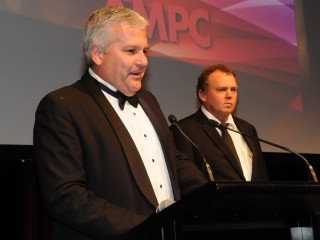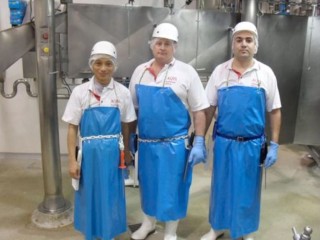 There was more than a touch of irony in the presentation of the 2011 Red Meat processing innovation award during the Australian Meat Industry Council’s recent annual conference.
There was more than a touch of irony in the presentation of the 2011 Red Meat processing innovation award during the Australian Meat Industry Council’s recent annual conference.
Queensland family-owned processor Nolan Meats received the 2011 award for its work in pioneering the application of food safety reform under the ground-breaking Australian Export Meat Inspection System (AEMIS). Sponsored by AMPC and MLA, the award recognises creative and practical solutions to challenges faced meat processors.
The AEMIS system of co-regulatory export certification will be enacted by industry from October 1, Ag Minister Joe Ludwig announced earlier this week (see earlier story, "Ludwig introduces new AQIS deal").
Nolan Meats, located near Gympie, is currently the only meat processor in the world exporting to the top-shelf export customer countries of the US, Japan and South Korea under the AEMIS system, under a pilot development process which had its origins as far back as 1995.
The AEMIS program developed under a commendable industry collaborative effort and piloted at Nolans, together with market access negotiations carried out through AQIS, have changed meat inspection acceptance in Australia’s major export markets.
Nolan Meats has long had a goal to gain access to all international markets, with company people fulfilling the meat inspection role. It saw such a move as simultaneously providing a stronger career path for personnel, and greater flexibility and efficiency within the role carried out by meat inspectors.
“Most importantly we believe AEMIS enhances product safety,” company director Tony Nolan said.
“It’s about building-in quality at all points of the supply chain to reduce costs: not putting faith in government to ‘inspect quality in’ at greater cost, at just a couple of points in the chain.”
“Quality and safety are our responsibilities under the system,” Mr Nolan said.
Facing the challenge
The existing AQIS inspection system did not allow for the required flexibility of a modern abattoir workplace and restricted career paths of team members, Nolans’ said in its nomination for the award.
“Having our own personnel take ownership and responsibility for meat inspection enables us to have a QA culture that embraces ‘total accountability’ instead of the government’s ‘all authority and no accountability’ culture,” Mr Nolan said.
Tracing back through the historical origins of the new AEMIS system, an alternate system of meat inspection was put forward by the Queensland Government in 1995. Its transition was supported by the then Meat Research Corporation.
Project One, as it became known, involved an alternative inspection system where instead of the Queensland government providing inspection services, the processing company provided its own personnel responsible for carrying-out inspections against the Australian Standard.
Exploding the company-based inspection myth
Nolans' was one of 15 plants across the nation that volunteered to begin the alternative inspection process in 1995, under for Project One. It was the only one to see the process through to today’s outcome.
“There was a perceived fear that company-based inspectors would allow unsafe or diseased meat to enter the market,” Tony Nolan said.
“We believed that that was only a perception and that the training provided to inspectors, operating in a robust quality system, would ensure that that did not happen. In fact when true Quality Assurance principles were applied, an even higher quality outcome could be achieved at a lower cost,” he said. “Recent history has supported that belief.”
To assist in developing the process, Nolans implemented an internationally recognised and structured management system to add discipline to the decision-making process. The company became the first meat processing company in Queensland to gain AS/NZS ISO 9001:1994 accreditation.
In 1996 Nolans was also one of the earliest abattoirs to train company meat inspectors and take over state government responsibilities for inspection functions.
“By participating in the inspection process it allowed our company to show innovation through focusing on and improving the food safety standards, rather than being controlled by State Government inspectors with little connection to the business,” Tony Nolan said.
Having company personnel accepting the responsibility of meat inspections meant it was also able to accurately collect whatever data was required to embrace continual improvement throughout the supply chain.
As a result, productivity has been greatly improved, by having meat inspectors multi-tasking and performing all or part of other tasks necessary to allow smooth and efficient production flow. It also allowed valuable feedback to be transferred back up the supply chain where problems were identified.
First access to seven Asian markets
Against this backdrop, Nolan Meats moved to Tier 1 abattoir status in 2003, where company inspection accompanied by external AQIS verification and certification allowed exports to an initial seven countries that accepted the Australian Standard. These included Singapore, Thailand, Indonesia, Malaysia, Vietnam, Philippines and Cambodia.
In consultation with AQIS, Nolans moved to Tier 2 status in 2005, with an AQIS on-plant vet, with the aim to implement the Meat Safety Enhancement Program (MSEP) to increase export market access. MSEP was the name given to the stalled MRC Project 2 which tried to mirror the successful domestic Project 1, but encountered several impediments in various export markets.
 The revitalised program had a strict protocol agreed to by AQIS and the USDA’s FSIS to guarantee safety and suitability of products while maintaining the integrity of Australian meat in the US market. The primary aim of MSEP was achieving US equivalence and ultimately acceptance in all export markets.
The revitalised program had a strict protocol agreed to by AQIS and the USDA’s FSIS to guarantee safety and suitability of products while maintaining the integrity of Australian meat in the US market. The primary aim of MSEP was achieving US equivalence and ultimately acceptance in all export markets.
The MSEP trial included increased microbiological assessment along with process and product verification activities carried out by the company overlaid with fortnightly AQIS audits.
To satisfy US legal requirements an AQIS-employed inspector was place at the end of the production chain to provide US-required ‘carcase by carcase inspection by a government official’. This program formed the basis of what has now become known as The Australian Export Meat Inspection System (AEMIS).
The first trial was commenced in 2006, with systems improved and developed where necessary to meet the protocol standards.
One criterion was to collect microbiological data at ten times the rate of any other plant collections in Australia, for the duration of the trail. Results ranked Nolans equivalent to or better than the highest 20pc of plants in Australia.
A second-stage trial sought, and delivered further improved from the initial six week trial – a tough ask when already ranking in the top one percent of all Australian results for e.coli and salmonella testing.
The second round results had to again be subjected to a US review process.
Historic first US exports
After passing this review, Nolans started export to the US in late May, 2008. As part of the conditions of the program it was required that the first ten shipments be subject to 100pc re-inspection by USDA for macro contamination as well as microbiological sampling of all shipments.
All containers were fully accepted into the US without any detection or other problems arising. By any measure, the trial had been an outstanding success.
Since then, the Nolans plant at Gympie hosted five USDA visits and audits over two years allowing both high-ranking USDA officials and technical staff to view the program first-hand and to gain understanding and confidence in the system.
By way of comparison, most Australian processors receive a USDA FSIS visit only once in every five to ten years. It was a rigorous process.
“The development of this process has made it possible for Nolan Meats to gain total control of the company’s destiny by taking full responsibility for all food safety outcomes,” Tony Nolan said.
At this stage the plant is a ‘one of a kind’, being the first and only meat business in the world with a company-based inspection system to export to the US.
The company has now achieved market access to countries that had been considered, under Australian Government Market Access terms, to be ‘too sensitive’ for the new AEMIS system. These included Japan, Taiwan and Korea. Korea has since conducted its own physical audits of the site to better understand the system.
From the commencement of the MSEP in 2005, Nolan Meats has received no R&D funding from AMPC, MLA, State or Federal Governments or any other institution. All costs were borne entirely by the company and it says it expects to achieve a five-fold return on its investment.
Much of the learning from the Nolan Meats project has formed the basis for the AQIS Export Certification Reform Program (ECRP) which is being rolled out by the Ministerial Task Force for adoption by industry.
This process is adaptable to any processor and as such will enable industry to have greater control of its own destiny if it chooses. With better control of the process, better food safety outcomes is the key result.
